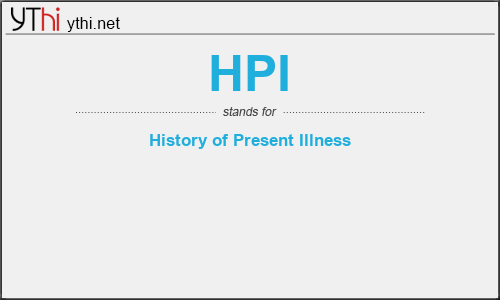What does HPI mean? What is the full form of HPI?
The Full Form of HPI is History of Present Illness.
Obtaining an accurate history is the critical first step in determining the etiology of a patient’s problem. A large percentage of the time, you will actually be able to make a diagnosis based on the history alone. The value of the history, of course, will depend on your ability to elicit relevant information. Your sense of what constitutes important data will grow exponentially in the coming years as you gain a greater understanding of the pathophysiology of disease through increased exposure to patients and illness. However, you are already in possession of the tools that will enable you to obtain a good history. That is, an ability to listen and ask common-sense questions that help define the nature of a particular problem. It does not take a vast, sophisticated fund of knowledge to successfully interview a patient. In fact seasoned physicians often lose sight of this important point, placing too much emphasis on the use of testing while failing to take the time to listen to their patients. Successful interviewing is for the most part dependent upon your already well developed communication skills.
What follows is a framework for approaching patient complaints in a problem oriented fashion. The patient initiates this process by describing a symptom. It falls to you to take that information and use it as a springboard for additional questioning that will help to identify the root cause of the problem. Note that this is different from trying to identify disease states which might exist yet do not generate overt symptoms. To uncover these issues requires an extensive “Review Of Systems” (a.k.a. ROS). Generally, this consists of a list of questions grouped according to organ system and designed to identify disease within that area. For example, a review of systems for respiratory illnesses would include: Do you have a cough? If so, is it productive of sputum? Do you feel short of breath when you walk? etc. In a practical sense, it is not necessary to memorize an extensive ROS question list. Rather, you will have an opportunity to learn the relevant questions that uncover organ dysfunction when you review the physical exam for each system individually. In this way, the ROS will be given some context, increasing the likelihood that you will actually remember the relevant questions.
The patient’s reason for presenting to the clinician is usually referred to as the “Chief Complaint.” Perhaps a less pejorative/more accurate nomenclature would be to identify this as their area of “Chief Concern.”
HPI
means
History of Present Illness![]()
Translate History of Present Illness to other language.


Leave a Reply
You must be logged in to post a comment.